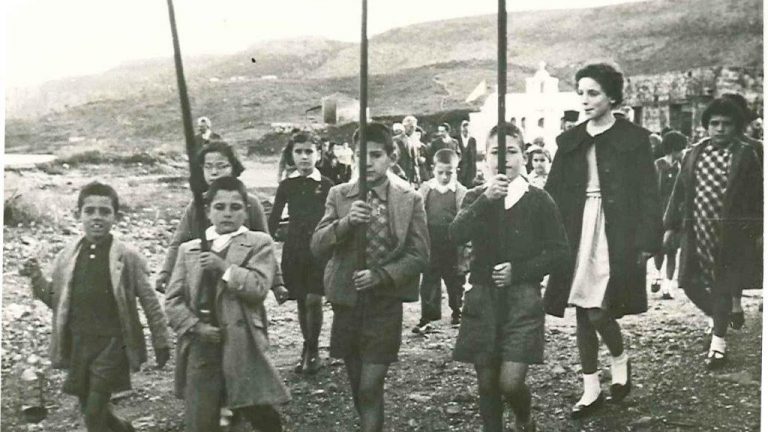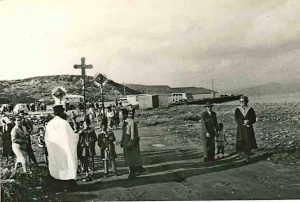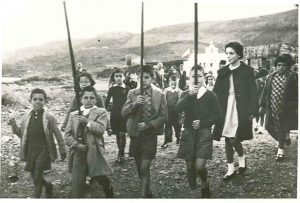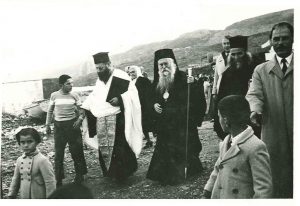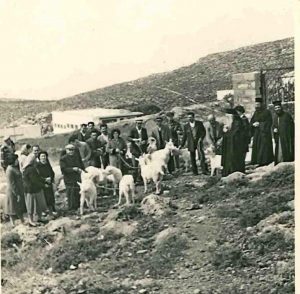The ideas of the Koksma’s about community development, what they experienced in Northern Greece, arrival at Kythera, their very first meeting with Kytherians in Chora and thus meeting another culture.
Mr. Johnson was a wonderful man. Broadminded and kind, matter of fact when need be, and tactful.
“Go and re-make the island” he wrote to us. “Take a trip through Greece and visit all the development teams that are working there. It may give you an idea about how to start”.
We did. We found people working and involved with buildings. Houses for poor people. They were simple, well designed, well built houses, but different from any Greek house. The future occupants would find themselves in an awkward situation. The design was a typical example of Western thinking and values, a bomb amidst the so conservative Greek culture. There was no supervision as far as we could see and we were not over impressed. There was another team, from another country, working on the agricultural improvement of a certain area. The director was an agriculturist, well trained, wise and constructive. In every part of his work he was dealing with experts. We thought that this was far better than the no object teams we met. (And far better than the sentimental ….?).
There was quite a number of them. Something just like ourselves.
Indeed Mr. Johnson was a splendid man and he helped to build up development work as much as he could, but it was utterly unscientific.
In fact, all the work of those many teams that worked without clear and concise, or elaborate, orders were, we felt, just the self satisfaction of a collection of agencies supported by the insufficient means of sentimental men.
We saw boys and girls sent into the weird mountains of Macedonia.
Some of them had training as agriculturists of some degree, others were social workers, plucked out of a modern town and transplanted into the most primitive world of impoverished mountain inhabitants under hot suns and biting winters.
Their given order was something like “try to do something for this poor people”.
We made interesting trips along a whole series of villages where there was not even a road to reach them. We investigated many things.
“How did you start this business? Where did you begin?” we asked a nice girl, working in a steeply sloping place of poverty and misery.
“It started quite recently with the widow Soandsòpoulos” she told us. “Her hut was leaking and the mud had been falling out of the fascines that made the walls, you see, and her position was hopeless. And winter was coming. So, I hurried and helped her…”
“With decent materials, of course?” I interrupted.
“Yes, with my own hands” she answered, not grasping the meaning. Materials, what materials… what for? She had used a lot of Christian love and mother Soandsòpoulos was very grateful of course…
And the second case was poor mother Soandsoìdis. She had a sick child, and since the doctor lived five hours away, he only came once in every four weeks perhaps, and so she herself had cured the infant…. And look, now there were flowers around the houses, lots of flowers, and there was a fine girls club, you know. They did canning and sewing and weaving and mending. Oh, they learned quite a lot. Quite important improvements in that village…
Yea, yea! They did not know better…
Indeed, I asked someone three or four years later. He knew the village very well. People still remembered the nice American girl who had been there and had taught them such a nice dance, something like “rockroll”. They still danced the thing sometimes. Enormous fun it was. Then you could laugh… ho, ho, ho!
“Splendid, but tell me, what about the girls club?”
“Girls club? No … there is no … what do you mean exactly?” deep wrinkles. “Well, they did all sorts of things; they do canning, weaving, mending, all sorts of things. Wonderful idea such a club… never heard of it”… still more wrinkles. “Was that perhaps in the church?”
“Oh no, the club had its meetings in the large room under the house of that girl, don’t you know?!
“Oh, that is now a stable again. Clubs for girls…. Hmm!” contempt…
“Do you know the old widow Soandsòpoulos?”
“That is the one who is always whining about her hut, on top of the Black Rock? That is the one you mean?”
“Yes, that is the one, thus she is still whining, isn’t she? A pity. And the sick child of Soandsoìdis?”
“Oh, that is better, but they always have something…”
That was one.
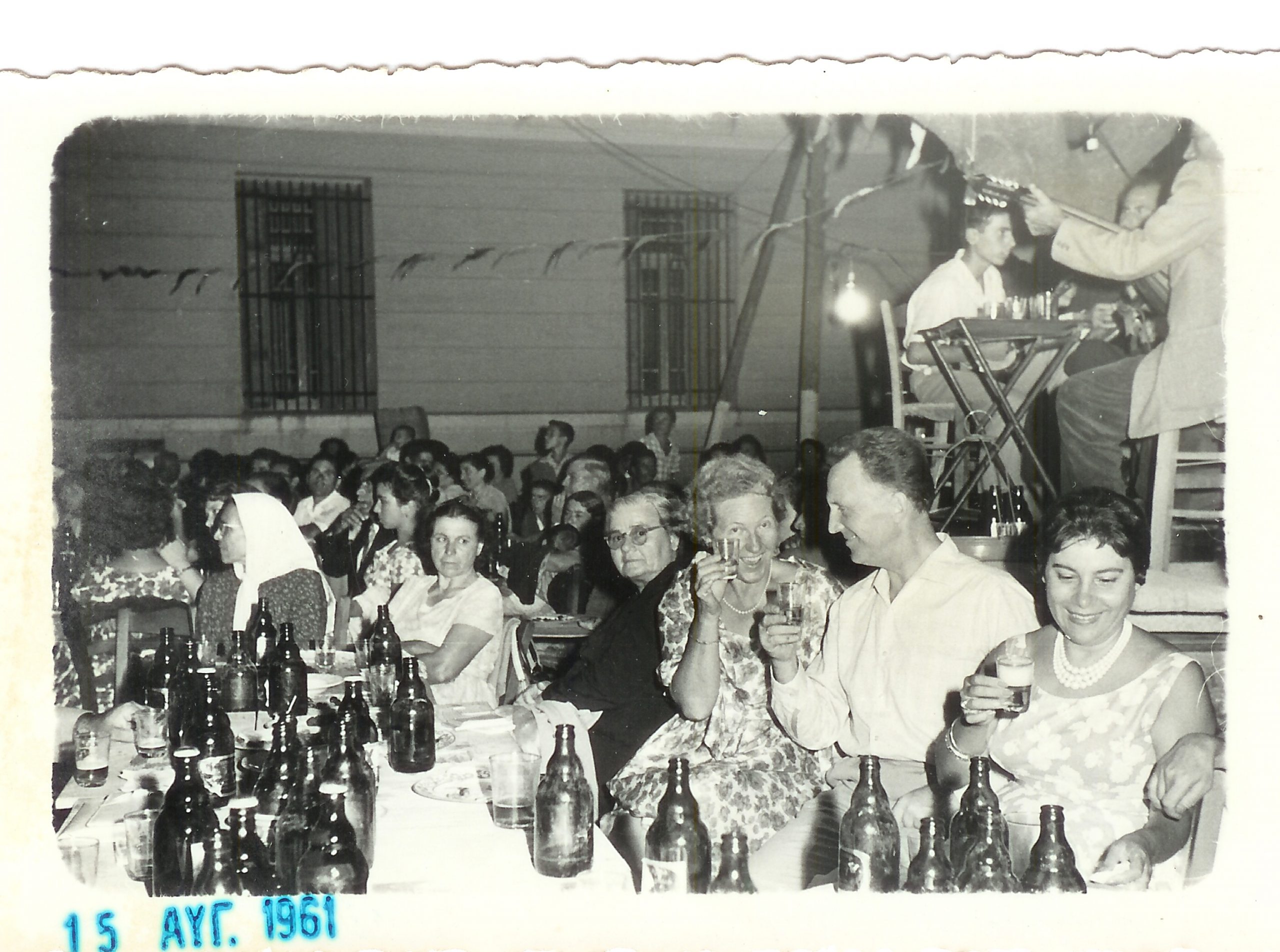
Another village did far better
They constructed a stretch of road. At least a road within the village. One man got support for a stable which he built with his hands. There was a girl’s club and a public shower. Yes, only for the hot summer-days. In wintertime it is quite an ordeal to get the pipes dry, because otherwise the thing would burst on account of frost, but that was not so important. Then, however, the most energetic girl (American, I believe) made one mistake, she fell in love. Quite a drama, and before the two years had finished, she left overnight. And the village wept. The schoolmaster as well, but he knew that he never could offer her a decent sort of life such as she was used to. Her father’s income was thirty-nine times his…, the stable is now the best room in the house of the proprietor, and the common showroom has a fine destination as well. For the president saw the thing and got an idea. The Agricultural Bank had no decent room for the imported manures and fertilizers. It would be easy to remove these inconvenient pipes, and then, with some stones, the thing might be large enough for a storehouse. Better still, the agent of the Bank found some drachmas, a mastoras made a fine concrete plate over the whole thing and the storeroom was ready….
The girl’s club started well and lived as long as Mary (the replacement! You should always leave your work in the hands of a replacement who can carry on!) was there to guide them. But Mary married and now there was no replacement for Mary and the club slowly dried up. A matter of three months.
That is what they called community development ten years ago. Devouring thousands and thousands of pounds and dollars without result.
“Would you do it that way, George?” Annie asked me one day when we were studying all this discouraging nonsense.
“No. Of course not!” I had my education in planning. Town planning as well as regional planning. “I think we will find a way somehow. But this here is a waste of good money and manpower. They are ahead of us in the agricultural section and social work. But we will manage that! Should like to know Mr. Johnson’s opinion about all this!”
Our friend Mr. Johnson, however, knew about the difficulties of the job. Pity that he lived in Paris (Geneva). It is so far away from Monaxìa (Kythera). How could he help us, encourage us for instance, or give us some hints if need be? Still, he did much for us and we remember him with great affection, now that we have had many years acting and dealing with people that succeeded him, but who had not one tenth of his spirit…
When we descended from the great steamer into the rocking barge alongside the old ship, Annie was annoyed. “You have to build a mole here, as soon as possible, so that this ship can dock! We ‘l never get ashore I’m afraid!” (The Arrival)
Certainly, the sea was rough and the little boat danced to the small quay, but every one of us and all our luggage indeed came ashore and the well-known jeep of the Bishop took us to his house.
“Welcome to Monaxìa!” he cried and showed unmistakably his profound satisfaction. “After so much correspondence and so much waiting, here you are at last, aren’t you?”
There were wonderful Turkish coffees with glasses of cold water and then we could go to bed. “Tomorrow we will talk a bit. No, not much, because I’ve to go to Athens for four weeks!” he grinned and that was the real welcome….
(click on a photo to enlarge)
So, we would be all alone, without any friend to back us up, without knowing a word of that horrible (difficult) language. No, that is not quite true, we were able to offer a decent greeting in the morning, throughout the day and in the evening. And we knew the word for donkey, that is, gaidoúri. But it’s somewhat monotonous to say gaidoúri all day to everyone, and how were we to learn more? There are booklets which give the impression that there is some “easy way” to learn Greek. Well, they are lying! There is no easy Greek. And moreover, we are a bit over twenty, so learning does not come as easily as in our college years….
We bade farewell to the Bishop next day, and when the boat had taken him away, we looked at each other and found ourselves very lonely at Monaxìa. “Well, George, my boy, tell me, how do you want to start this community development of yours?”
“Yes, how?” I grinned and looked around. The inspiration however came again from Annie.
“As a matter of fact, we are quite free for the moment, aren’t we?”
“Of course. Let us have a look around”
“Alright, but then, let us go to the old people Fournàtis (=Kasapis)!”
“Fournèras!” I corrected. An irritating habit, that has never left me.
“Well, couldn’t we do that? Both of them speak French (=German), so we can have some conversation. They are still alive, the Bishop said.”
I still knew the way to their house. I had not yet been inside, but when I visited Monaxìa for the first time they had told me where the old surgeon lived. One of the smallest houses in the town, a little kitchen, a sleeping room without light or air, and the drawing room. But what a room that was! Crammed full with the remainder of old glory. A real Turkish room. Walls with carpets and rugs and wonderful calems (=camel-seats?). Old Arabian rifles, a splendid bench and really easy chairs. That was something special. Of course, because they were special people. This visit was just to renew our acquaintance and I do not want to say more about it, because I will return to the entire story of Dr. Fournèras in a more particular context. After a very encouraging conversation we left again and felt our way through peculiar narrow streets, through shy or kind greetings, through numerous stinking donkeys with full laden baskets, through quite a strong wind to the outskirts of the little town.
“Well, now for a walk!” I decided. “Let’s see, I was here some six months ago, I think we better go to the next village. We will have to turn around yonder rocks to reach it.”
“What else could we do?” asked Annie.
“Nothing. Let us reconnoitre. That is the obvious thing to do first. Let us see where we are. As long as the car is not here, we can better examine the structures around us, and see where exactly we are living now.”
And off we went, along an asphalt road. The first improvement in the central road of the island, five miles of asphalt, and then the bedrock with its unending mass of stones of every size. How would our car manage there? We marvelled at everything. The scenery was wonderful, the trees strange, the flowers all over the place, the scent of them coming and going with the gusts of wind, those were indeed the only pleasant experiences. Along the road there was a tiny trickling spring beside a small white church. Lots of churches we saw. Twenty-three within the circle of our view. And all over the place limestone. Hard, soft, middle and other formations. Marl and half marble, but mostly black karst rocks, with poor vegetation in the manifold cracks. When we were in the midst of those cruel formations we found them not very encouraging.
“What can you make of all of this, George?” asked Annie again.
“Nothing, darling,” I said, and felt a bit grim. “But there will be enough to improve I think, this is not the only terrain. We’re still in the vicinity of the little capital and there are twenty more villages!”
“Let us go back. Perhaps something has happened” Annie said, and so we did.
It was rather late when we came back to the tavern but Mrs. Pappadopoulos again served us a fine meal in the Bishop’s house. In the meanwhile, she tried in vain to inform us about something. We did not understand a word of course, only the repetition of Mr. Kondouris name.
“Kala, kala!” I cried, and some minutes later Mr. Kondouris came to see us. A rather young man, very tall for a Greek, but fat as usual. He was handsome, well educated, lazy, but a member of the high society of the capital Monaxìa. We greeted each other with bows introducing ourselves…. Fortunately, he knew some English. Some. And he had the tremendous honour to invite us into his house…. The very distinguished Engineer and Madam Martin (=Koksma), the people that were going to save the poor little island of Monaxìa from the almost inevitable ruin… He was glad that we would be the first of the masses that would compete for the favour of our friendship, because this sincere wish came straight out of his heart and was no hollow form….”
At seven o’clock we went to the other side of the road and found Mr. Kondouris’ mother waiting for us. That was the woman who had prayed for her poliomyelitis son, of course…. I hoped that she would not try me with all sorts of nonsense from the very polite old-fashioned Greek ways, and with much satisfaction I learned that she spoke French and did not overdo things.
She led the way into one of those very old-fashioned rooms that we knew from Western Europe’s countryside of fifty years ago. Only without plush. Just fifteen-minute-chairs and the occasional stiff armchair. All the chairs were along the wall, just like the old sofa, stiff and hard, on which I settled down.
There were quite a number of guests and everyone smiled gently and graciously. Old madam Kondouris knew her world and started conversation after the introduction of people who talked Italian, German, French, Dutch and English. She did not start the normal informative questions, but they were inevitable like the ruin of Carthago and soon they arose:
“Have you got children, Mr. Martin?”
“We have only one daughter, Monsieur.”
“Ah, you have one daughter…. Is she married perhaps?”
“Yes, she is married. Otherwise we would not have left her behind…”
Everyone agreed. Of course, of course, imagine…. Well…
“There are not any grandchildren yet….?”
“No, there are none yet… Moreover, our daughter is still studying!”
“Ahhh!…. Still studying, eh? Poh, poh, poh… and she is married?”
“Yes, she studies psychology and that is a matter of some seven or eight years. When the girls have finished their high-school they are something like eighteen. Eight years more brings them up to twenty-six, and that is for most girls of the Western countries rather old to start up with a partner….”
“Oh, certainly, that’s far too old… here they marry at sixteen, seventeen, up to, let us say twenty-one, twenty-two….”
“And what do you think of our island, Madame Martin?”
“I think it a bit premature to say much about it, I ‘ve seen so little of it as yet…. I think that I will with quite significant parts which are not so wonderful as the environment of the capital….”
“Why so?… if I may ask you…?”
“Well, quite simple, I think that nobody would have asked us to come here, if the rest of the island was of the same richness and beauty!”
Bravo, Annie! That’s the right tone. She stole their hearts.
“And what are you going to do first, do you think?”
“I’m going to look around and study your island and your language…”
“Ah, bravo! So, you won’t go around always with an interpreter?”
“We will have to do that at first, but as soon as possible we will try to do without!”
“What do you think of tourism?”
“What do you want me to answer? Is there any here at Monaxìa?”
“Practically nothing!”
“Well, then we should all work for it fervently, I think!”
“Sure, sure, but what do you mean by all of us?”
“I mean you, Sir! And Madame there and everyone…. Something can only be achieved when everyone collaborates with those who are going to work for progress…”
“There won’t be progress without a ferryboat, Mr. Martin!” stated old Mr. Kondouris. “I’ve told them here for years and years now that there should be a good connection. Without the connection there will not be any progress.” and pugnaciously he looked around.
“I’m afraid that you are right, Sir, but again I cannot say anything for sure, until I have studied the troubles of the island more closely.”
“Of course, of course….. And besides, Mr. Martin has to get acquainted with the population and the circumstances, isn’t that so?” some fair and very fat woman declared.
“Oh, well, I do not doubt that the great organization which is sponsoring this work, will give the means to improve everything here. And we need it bitterly, because the poverty is very severe, Sir!” In the meanwhile this neighbour of mine tackled his wonderful bit of almond-cake, simply called “the sweet”, and sipped his liquor. That is the welcome menu for every visit. Usually the sweet is just a piece of chocolate.
Since this neighbour had been speaking English, someone translated. The air was full of murmurings. And some conversation in Greek was proceeding as well. It was an unpleasant mixture.
Too many noises and too many sweet meringues and cakes and pies and cookies and candy. To much too. And tea that had been made with three spoonfuls of sugar…
“I heard that there is at your disposal every year one million dollars, Mr. Martin. But that would be an exaggeration, I suppose ….”
“A little, yes. Our budget goes up to thirteen thousand a year, Sir. And for the rest it is up to the population. The population has to do the trick. It is not for giving away money that we are here. We can only help you to improve. The population has to improve itself.”
“Quite right, quite right!” cried the fat woman, the only one who had not experienced a tremendous set-back at my statement and never seemed to be disappointed. “If they want more water, they should first utilize the water there is!”
“Quite right!” I repeated.
“But listen,” a silent gentleman added to the general conversation, “how are we supposed to make irrigation-systems and water-systems and all that when there are no funds available? Kriavrissy (=Karavas?) wants a water-system, for instance. How can they make that? With their hands? And where do we get the materials?”
“I think that there is quite a considerable part of the population of Monaxìa, that can supply money enough for such improvements,” said Annie directing her gaze towards the heavily laden table.
“Sure, sure, there will be support from outside, from abroad. They say that fifty-thousand important Monaxìans are living abroad. And most of them are well to-do people. But there is so much need. A harbour at Limenaki (Kapsali), and a shelter for the fishing boats, and a harbour at Kokinamo (Kokinoammos? =Agia Pelagia) and roads and more roads… how can we give for all that?”
“And we need industry! All the world cries for industry nowadays. You don’t mean that Monaxìa is any exception?”
“And the promotion of tourism! There is much money in tourism…”
“Tourism is the future of Greece, gentlemen!”
“But let us not forget the agriculturists. There is much to do in that branch as well. What do you think we can do with our fields?”
“And everyone forgets the honey-industry. That should be put on a more modern level. Everyone knows that…”
And so on, with everyone talking to everyone in every possible language and mentioning in one breath all the sore points of their special ambition. And I felt sick. Because of the strain and the tension, because of the heat and because of the sickening sweets!
“And what do you say to all this, Mr. Martin?
“I’m afraid you have not yet mentioned everything,” I said, trying to escape.
“Of course not!” jubilated Mr. Avanti (survival of the Italian occupation) “Nobody has mentioned education. And everybody knows how backward we are! A tremendous field for improvement. I wonder if Mr. Martin’s orders stretch that far….”
“I’m very sorry, Mr. Avanti,” said Mr. Kamarotos, “but education, although being of great importance, does not belong to the primary requirements of the people. There are basic needs that have to be met first. Water, Sir, water, and I should like to stress the fact that our honoured guest has already mentioned this item when he was here one year ago, and even in this very conversation…”
“Of course. Without water-retaining dams, we cannot have any improvement in circumstances here at Monaxìa! another interrupted.
“But from where would he collect all the money that’s necessary for such tremendous work?” ventured Annie.
“We were of the opinion, Madam, that your combination of churches was a very wealthy one…”
“Let us assume it is,” she (Annie) said, “but I think you know that half the world population is starving…. You read about it, don’t you? Well, we should like to try to do something for everyone…. That is to say, for more than a million men!”
“A million, madam, one and a half million. We live in times of a boom so to speak. Of a population-explosion.”
“Right you are, of course, but still I stress the need for education! And, in connection with that, there is another thing. Ninety percent of the island has no light! We need electricity, and we need it badly….”
“Another bit of chocolate-cake, Mr. Martin?”
“No, thank you sooo much, Madame…. It was wonderful….” I crooned
“Funny, that none of you has mentioned development of the fruit-cultures of the island….”
“Bah!”, said Mr. Kondouris, “You are fatiguing poor Mr. Martin, and overburdening him just now. I think, we should wait and see what Mr. Martin proposes and what help he can offer. Even if it does not amount to all these millions, still it will be worthwhile. And as for me, Mr. Martin, the mere fact that you have come is welcome to me and to all the island.”
Ah, here was one of a bunch of V.I.P.’s with brains.
However, he spoiled his own evening. People had been deprived of their themes and were obliged to ponder over still other important themes.
We found a chance to leave and I went straight to my bumpy bed. Such a head-ache I had not suffered for years and years.
“Not me,” said Annie, “I still want something to eat. Something salty. I’m sick of all these sweets. Too much of them in my opinion. Won’t you come with me?”
“Not this time, I’m really sick of all this. It has gone to my nerves and I want to sleep, I’m clean finished. Fine by me if you leave me alone….”
She did, the darling, and when I dozed off, I had the unpleasant feeling that my first community-development-day had not been a tremendous success.
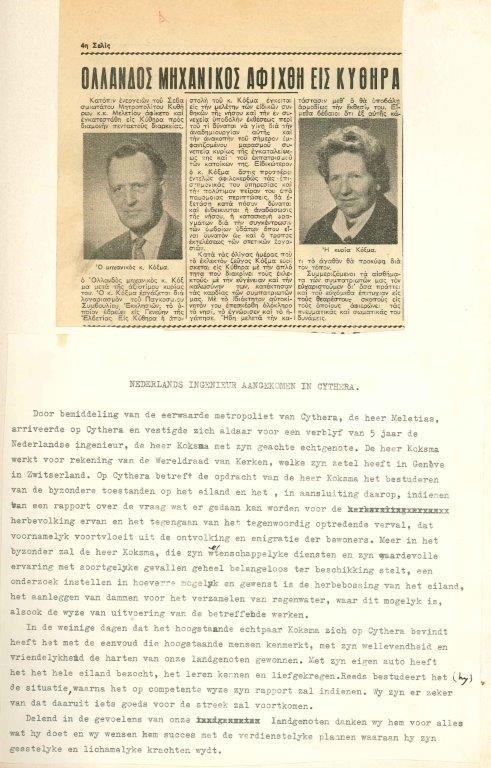
By J.M. Koksma.(In Word by Jean Bingen, Nov 2009)
